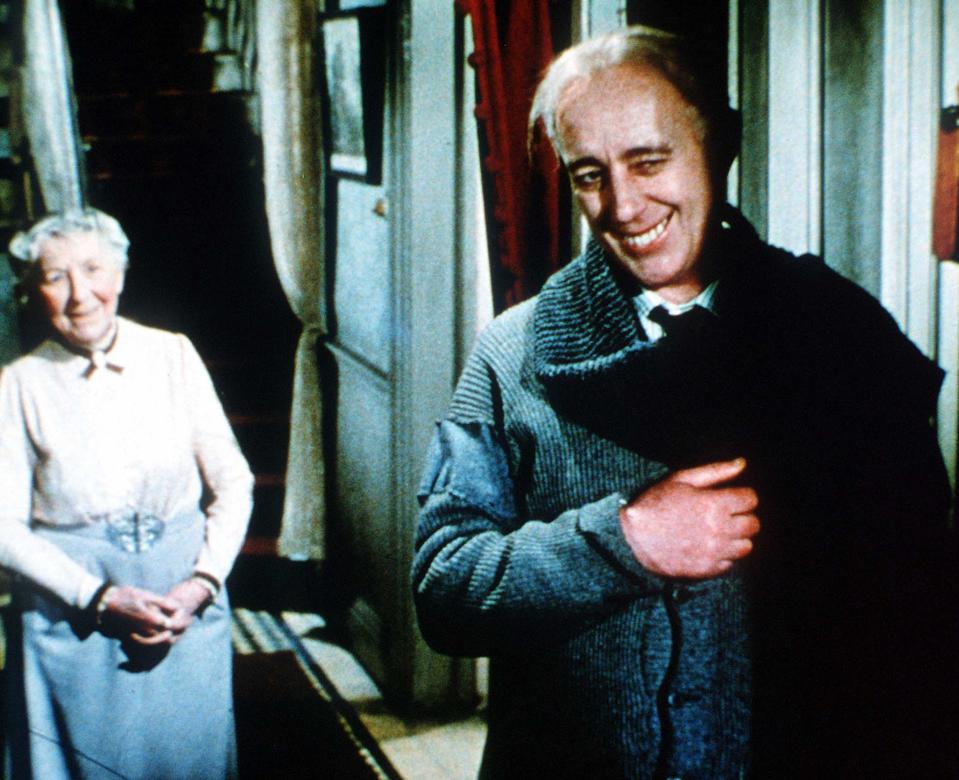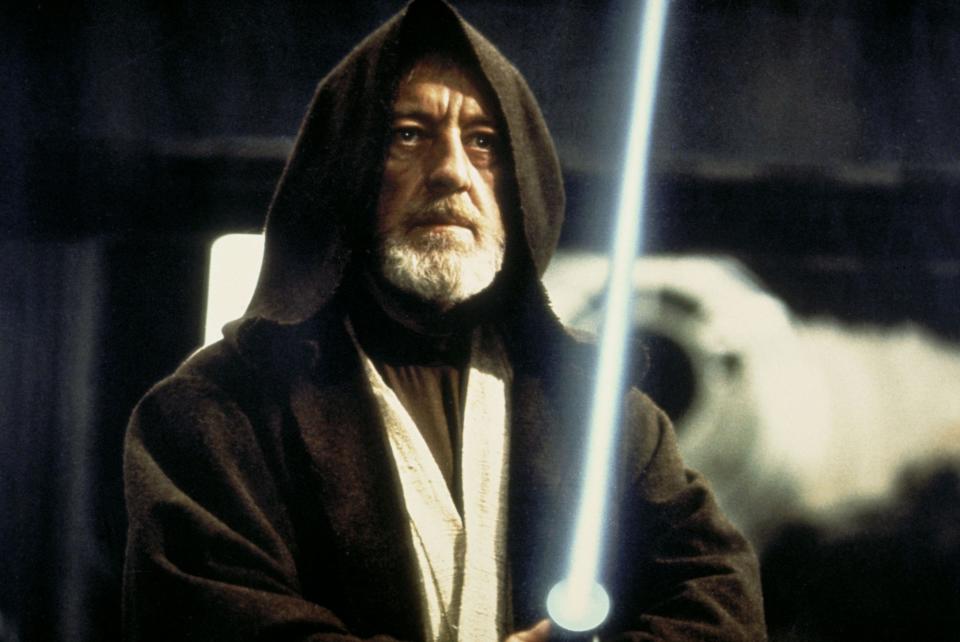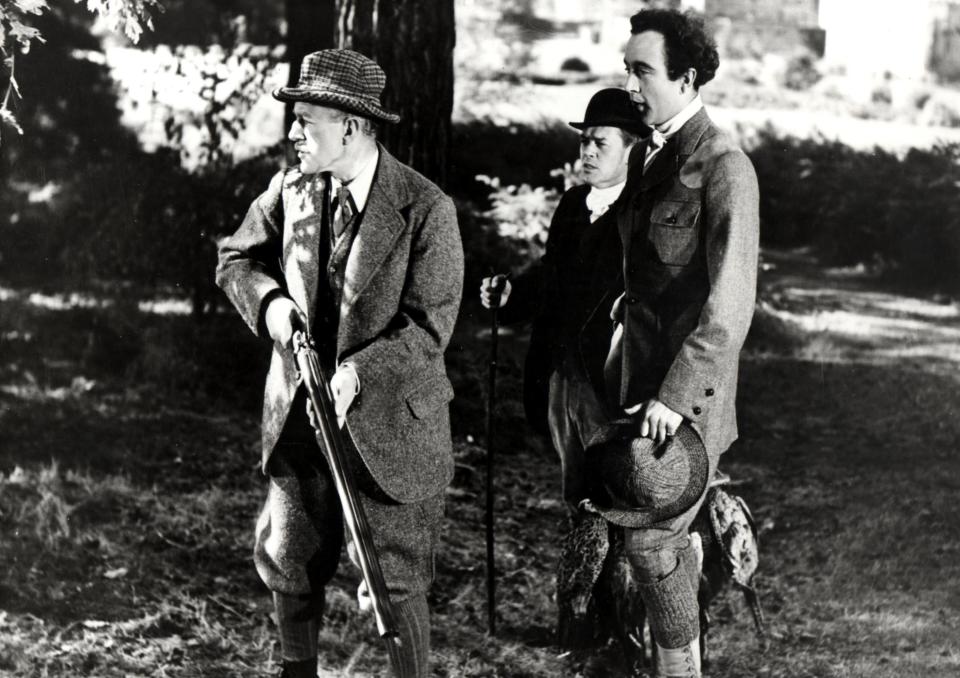Alec Guinness: Why he was at his best as the king of creeps

The parrots know it. They screech. The music knows it, becoming ever more strident and full of foreboding. Only the landlady, sweet old Mrs Wilberforce (Katie Johnson), doesn’t realise what is already apparent to the audience, namely that her prospective new lodger, Professor Marcus (Alec Guinness), is a consummate creep and a thief to boot. It isn’t just his protuberant, rat-like teeth. It’s his unctuous, shifty manner. The filmmakers first show him on the streets near St Pancras in dark silhouette, as if he is a vampire.
These are the opening scenes of Alexander Mackendrick’s classic Ealing comedy, The Ladykillers (1955), shortly to be re-released in a 4K restoration. Guinness gives one of his most memorable performances as the "professor”, hiding out with his thuggish accomplices in Mrs Wilberforce’s rickety, bomb-damaged house while plotting a robbery in nearby King's Cross.
For some audiences, Guinness (1914-2000) is most fondly remembered as Obi-Wan Kenobi in Star Wars, a noble Jedi master known for his courage, decency, and devotion to justice and humanity.
“Can’t say I’m enjoying the film,” Guinness wrote in a letter that was quoted in Piers Paul Read’s authorised biography of the actor to a friend early during shooting of the first Star Wars (1977). “New rubbish dialogue reaches me every other day on wedges of pink paper – and none of it makes my character clear or even bearable.” It didn’t help his state of mind either that his co-star Harrison Ford persisted in calling him “the Mother Superior”.
Guinness was eventually very appreciative of Star Wars, describing it as “a pretty staggering film as spectacle and technically brilliant”. He enjoyed the huge amount of money it made him too. Nevertheless, Obi-Wan Kenobi was among his least characteristic roles. He hardly ever played conventional heroic types.

When Guinness took on Hamlet on the London stage in 1951, the reviews were frighteningly hostile. According to the Evening Standard critic, this was “the worst production of Hamlet I have ever seen”.
It was as if the actor was so stung by the criticism he was determined never to put such a big target on his back again. When you play vacuum cleaners/intelligence agents, as he did in Our Man in Havana, crooked bank clerks (The Lavender Hill Mob), textile inventors (The Man in the White Suit), or inscrutable spies (Tinker, Tailor, Soldier, Spy), you’re not held up to the same scrutiny as when you take on Shakespearean tragic heroes.
“A sort of anonymity sits about Alec Guinness, perhaps the most accomplished actor of British stage and screen. He is a man to pass in the street as one would never have passed Kemble or Garrick, or would now pass Olivier or Gielgud,” the Belfast Telegraph wrote in December 1953, comparing him to the big name stage stars of his own and previous eras but noting what a paradoxical figure he was; a star in the cloak of invisibility.
On-screen, Guinness was rarely persuasive in romantic leads. “One is never convinced that Alec is sexually attracted to his leading ladies,” his friend Piers Paul Read writes in his biography. His characters, for example, his George Smiley in Tinker, Tailor, Soldier, Spy, were frequently cuckolded or betrayed by those closest to them. Generally, sexual charisma is one of the main prerequisites for movie stardom. Guinness didn’t have it but still ranked among British cinema’s most popular and bankable names. He could transform himself into almost anyone other than a dashing, womanising hero. “He does everything by stealth,” critic Kenneth Tynan wrote about Guinness in Harper’s Bazaar in 1952. “His face, bereft of its virtuosity of make-up, is a signless zero.”
That was his greatest advantage. Guinness’s screen popularity was achieved in spite, and because, of his rarely playing straightforwardly sympathetic roles. He was much more often cast as repressed or seedy eccentrics. His genius lay in his flair for deadpan comedy and in the way he conveyed the yearning and suffering of the many misfits he portrayed.
Early in his screen career, Guinness caused riots. When he starred as the miser and street thief Fagin in David Lean’s Oliver Twist (1948), there were demonstrations in Berlin amid claims that the British authorities were, as the Daily Mirror put it, “deliberately showing the film as antisemitic propaganda”. The Lord Mayor of Berlin signed a petition calling for Oliver Twist to be banned.
In Lean’s previous Dickens adaptation, Great Expectations (1946), Guinness had played the fresh-faced, breezily optimistic, slightly camp Herbert Pocket. Always fond of extreme contrasts, the actor subjected himself to hours at the hands of master make-up artist Stuart Freeborn every morning in order to portray Fagin. He wore a false nose, a matted red wig, and straggly beard. He also insisted on the make-up being put on, and the transformation accomplished, at dawn, before anyone else had arrived on set.
The other actors and technicians only ever saw him as Fagin. It was a virtuoso performance but also an insensitive one. Neither he nor his director Lean had anticipated how offensive this Fagin was bound to appear to some audiences in the wake of the Holocaust.
Pocket and Fagin come from different ends of Dickens’s imagination and Guinness was determined to show he could portray both equally effectively.
"He was an actor like a chameleon, who could change his colours,” his old friend Ronald Neame, producer on Leans’s Dickens movies and who directed Guinness is some of his best, and most underrated film roles, said of him.
Kind Hearts and Coronets (1949) is often regarded as Guinness’s greatest achievement on screen. He played multiple different members of the aristocratic D'Ascoyne family including an admiral, a priest, a banker, a general and the formidable Lady Agatha D’Ascoyne, all of them murdered one by one by an impoverished relative (Dennis Price) who wants to inherit the family dukedom.
However, Kind Hearts and Coronets was all-surface brilliance. Arguably, Guinness’s performances in his films with Ronald Neame had more rawness, subtlety, and depth than either his Ealing comedies or his many roles over the years in David Lean’s movies, whether Lean’s Dickens adaptations or the widescreen epics which came later like Bride on the River Kwai (1957), Doctor Zhivago (1965) and Passage to India (1984). In The Card (1952), The Horse’s Mouth (1958), and Tunes of Glory (1960), all far smaller and more intimate films, Neame casts him as different kinds of oddballs; characters who behave very badly but still seem sympathetic.

Initial responses to The Card were muted. Critics seemed disappointed that Guinness was in a relatively restrained groove. Nonetheless, this was one of his most likeable and graceful performances. The film, adapted from an Arnold Bennett novel, is the story of Derry Machin, a working-class chancer on the make. In order to rise up the social ladder, he cheats and lies but does so with such good humour and zest that you can’t help but indulge him. Guinness plays Derry as if he is a cross between the aggressively ambitious Joe Lampton in Room at the Top and the daydreaming hero of Billy Liar. He’s ruthless and whimsical at the same time.
The Horse’s Mouth is Guinness at his most curmudgeonly. He scripted the film himself and stars as Gulley Jimson, the grizzled and thoroughly obnoxious artist who lives on a house boat on the Thames and borrows and steals from everyone he meets. Gulley has integrity. “I’m me own man,” he growls at one stage. He cheats in every area of his life other than his art. He’ll accept degradation, humiliation and poverty rather than compromise. It may be a clichéd view of the tortured bohemian painter but he tackles the role with complete conviction.
Guinness’s Scottish accent as Lieutenant-Colonel Jock Sinclair in Tunes of Glory isn’t altogether convincing but, again, this a performance in which he is prepared to show his darker side, and not to hide behind the comedy. He is a macho, hard-drinking officer in a Scottish regiment who has a streak of violence and viciousness and is prey to seething inner torments.
Twenty years ago, not long after his death, rumours emerged about a secret aspect of Guinness. One of his biographers, Garry O’Connor, wrote about his “homosexual life”. There was gossip about an incident in which Guinness, a married man, had allegedly been arrested and fined following an incident in a public lavatory in Liverpool. O’Connor had heard the story from fellow writer, Sheridan Morley, who told him: “Alec was clever enough to come up with a false name.” (He is said to have called himself Herbert Pocket.)
Rival biographer Piers Paul Read pointed out there was no evidence to support the story. “Police records and press cuttings turned up nothing. The rumour is possibly a conflation of stories about Alec’s “cottaging” and the arrest of John Gielgud in October 1953 in a public lavatory in Chelsea after dining with the Guinnessess.”

The story might be nothing more than malevolent, homophobic speculation. Nonetheless, it could easily be a scene from one of his films about evasive and furtive characters with tangled inner lives. Lean called him “one of the most fantastically knotted-up men I’ve ever known”.
There is a tendency today to view Guinness, the knight, and much loved British star with the instantly identifiable voice, in much the same way as the dotty old landlady regards Professor Marcus in The Ladykillers. She thinks he is thoroughly respectable and straightforward. In fact, he is as squint as the paintings on her walls. With Guinness, it’s his crooked side that makes him so endlessly fascinating as an actor; the sense that beneath that calm exterior, he is hiding something from us.
‘The Ladykillers’ is re-released in cinemas in a 65th anniversary 4K restoration on 23 Oct and on Blu-Ray and DVD on 9 Nov
Read more
Crash at 25: Sick and depraved or a serious piece of art cinema?
Halle Berry: How she’s upending traditional Hollywood attitudes about age, race and gender

